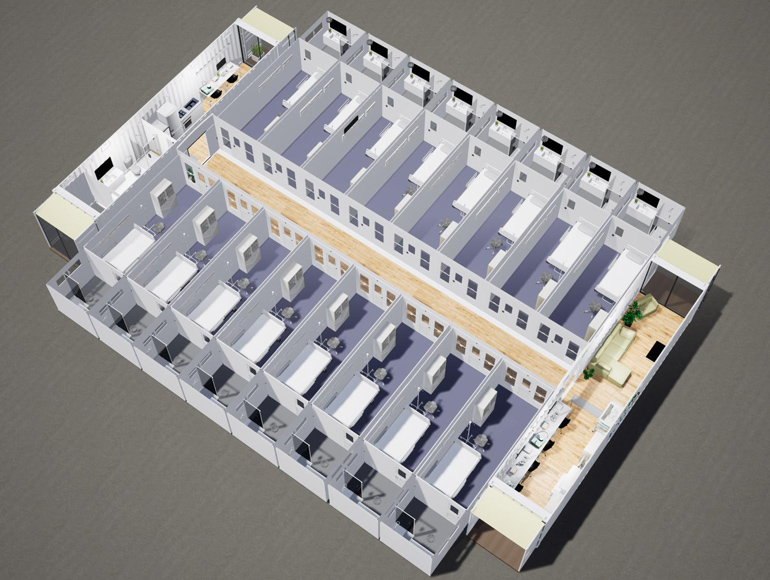Pop-up hospital may be answer to future pandemic needs

A South Australian company has launched a portable isolation hospital for widespread medical emergency hotspots to treat patients with respiratory illnesses in the wake of the COVID-19 pandemic.
Based in Adelaide, South Australia, Humanihut’s ‘Florey’ isolation hospital has received expressions of interest from government clients in the United States, Europe, Middle East and Australia to better prepare for future epidemics or health crises.
The deployable medical facility was adapted in partnership with French-based business Utilis International from Humanihut designs for disaster accommodation.
Humanihut Co-Founder and Managing Director Neale Sutton said the new Florey model was created for the COVID-19 outbreak in New York and serves as an efficient market-ready alternative to tents, which are the current industry standard for field hospitals.
“In the initial stages, the [coronavirus] epidemic had governments around the globe looking for very quick solutions to assist the pressure that was being placed on their medical facilities,” Sutton said.
“We’re now focusing our product into the longer term, it’s about what comes next after COVID-19 and after all of the equipment has been used on this outbreak; is there enough to be used for the next outbreak?”
Sutton said the Florey costs AU$200,000 per bed in comparison to approximately $1.5 million per bed for a hospital.
“The Humanihut Florey system is a far more robust and rapidly deployable system than just about anything else that’s around,” he said.
“We’re talking to a number of prospective clients around the world about what they’re going to do next and the part we can play in their operations going forward looking over their horizon to 2021 and beyond.”

Sutton said he was in talks with a local government in the US for the purchase of a Florey unit within the next 12 months.
In its basic configuration, the Florey isolation hospital comprises 16 flatpack huts each measuring 6 x 2.3 m (19 x 7.5 ft) that are set up as single-bed patient rooms attached with ensuites, which stand between two 40 ft containers housing a nurse’s station, staffroom, kitchen, bathroom and laundry.
A fully enclosed weatherproof internal corridor made from a soft polymer canvas is then placed in the centre of the facility to connect the containers and patient rooms.
The huts are steel skinned and have insulated walls, enabling them to maintain a suitable temperature for patients and doctors.
The Florey isolation hospital includes utilities for water, power and wastewater treatment, Wi-Fi connectivity, and medical grade equipment supplied by G3 Systems through Humanihut’s partnership with Utilis.
Sutton said two Australian companies provided the important airflow controls. The negative pressure air filtration system to prevent cross-contamination throughout the site is from Airepure Australia and the air conditioning is by globally renowned Seeley International, based in Adelaide, South Australia.
“Isolation wards require negative pressure systems, combined with specialist HEPA filters, to ensure the containment of airborne contaminants within a room, whilst reducing the risk of transfer of airborne particles to medical staff,” Sutton said.
The Florey is deliverable by land, air or sea inside the two 40 ft containers and can be established within 24 hours. The facility is also scalable for increased capacity to meet required demand.
Sutton said the rapidly deployable nature of the product was crucial for assisting medical workers at the beginning of a health crisis.
“[Clients] need things set up quickly, they don’t want them to be permanent, but they want to be able to call on them time and time again and once the field infrastructure system has done its job it can be packed up and reused again over the life of the product,” Sutton said.
More than half of the manufacturing process for the huts is done in South Australia, including work from South Australian companies Enviroclad and Kadego. Sutton plans to shift the remainder of the operations to the state later this year.
Humanihut has sold other variations of its field infrastructure systems to the South Australian State Emergency Service as well as to clients in Saudi Arabia and France.
This is a Creative Commons story from The Lead South Australia, a news service providing stories about innovation in South Australia. This work is licensed under a Creative Commons Attribution 4.0 International License.
Originally published here.
Local spirit: new Footscray Hospital, Melbourne
The new Footscray Hospital will be partly a result of local community campaigning —...
Designing with compassion
Balancing calm, serene spaces with acute facilities, the Anam Cara House is a unique hospice...
La Trobe Private Hospital reopens after redevelopment
La Trobe Private Hospital has reopened its doors following a complete redevelopment, giving...









